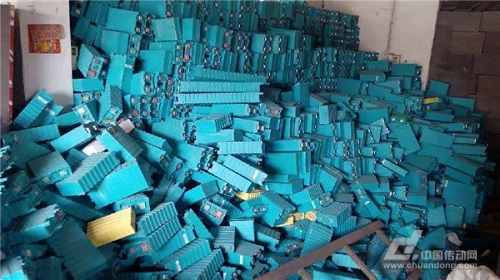
The challenges of illegal lead battery dismantling and improper disposal of battery solutions have made environmental protection a major concern. At the same time, formal recycling companies face issues such as low profitability, a limited market, and an inability to achieve economies of scale. These hurdles hinder the development of a sustainable and efficient recycling industry.
Reporters found that the power battery recycling sector, particularly for lead-acid batteries, is still in its early growth phase. While safe recycling methods are being developed, the peak period of battery waste—especially from electric vehicles—is approaching rapidly. This presents both opportunities and challenges for the industry.
The opportunity lies in companies that possess core technologies and can effectively recycle old power batteries. Such firms can not only prevent battery waste at the source but also capture a larger share of the recycling market. However, the challenge remains in curbing the illegal secondary battery recycling market. Additionally, learning from the successful practices of countries like Japan and Germany could provide valuable insights for China’s own recycling efforts.
The coming peak in battery scrap is inevitable. According to Yu Haijun, vice president of Guangdong Bangpu Circulation Technology Co., Ltd., while the market shows great potential, the long-term success of the industry depends on the company's technological foundation, business model, and overall strength.
For example, Guangdong Bangpu, which started in 2005, has grown from 20 to over 600 employees. It now processes more than 20,000 tons of used batteries annually and produces 10,000 tons of nickel-cobalt-manganese hydroxide. These numbers highlight the scale of operations in this emerging industry.
Looking ahead, the Chinese auto market is expected to see a significant shift toward electric vehicles, driving demand for power batteries. According to industry reports, new energy vehicle sales are projected to grow at a compound annual rate of over 30% in the next five years. This will create a massive increase in power battery demand and, eventually, a surge in battery waste.
As lithium-ion batteries replace lead-acid batteries in electric vehicles, the first batch of these batteries—introduced around 2013—will start reaching the end of their life cycle by 2018. This means the recycling focus will shift from lead to lithium batteries, increasing the volume of waste significantly.
By 2020, China is expected to have over 248,000 tons of power battery waste, a dramatic increase compared to 2016. Wang Binggang, head of the national new energy vehicle technology innovation engineering group, warned that if not handled properly, this could lead to a serious environmental disaster.
Recycling power batteries is not just about managing waste—it’s also about recovering critical metals like cobalt and nickel, which are heavily imported. Proper recycling can reduce dependency on foreign resources and support the long-term sustainability of electric vehicles.
With new energy vehicle sales reaching 507,000 units in 2016 and exceeding one million on the road, the number of discarded power batteries is set to rise sharply. By 2018, the amount of lithium batteries needing recycling is expected to exceed 170,000 tons, creating a recycling market worth over 5.3 billion yuan. By 2020, this market could surpass 10 billion yuan.
Companies like Guangdong Bangpu are already leading the way with a "directed circulation" model, where they collect and recycle batteries, then use the recovered materials to produce new ones. This closed-loop system helps reduce costs and supports sustainable growth.
The urgency to recover rare metals is growing, and government policies are starting to take shape. In October, officials from the National Development and Reform Commission visited Hunan to discuss power battery resource utilization, emphasizing the need for better recycling systems and stricter regulations.
Experts stress that the industry needs a comprehensive recycling framework, standardized systems, and strong research centers to ensure safe and effective battery recycling. Policies should also include mandatory producer responsibility, traceability systems, and stronger enforcement against illegal recyclers.
Japan has long been a leader in battery recycling, with a well-established system where consumers can return used batteries for free. Companies like Toyota and Honda have partnered with recycling firms to recover valuable materials from hybrid batteries, demonstrating how effective recycling can be.
While some companies rely on local subsidies, experts warn that long-term success depends on self-sufficiency rather than government handouts. The industry must also address the issue of illegal recycling, which is currently thriving due to weak enforcement and lack of oversight.
In conclusion, the power battery recycling industry is at a critical stage. With the right policies, technology, and collaboration, it can become a key part of the sustainable energy future. However, without proper regulation and infrastructure, the environmental risks could outweigh the benefits.
At OREMA, we are more than just a battery company; we are pioneers in the field of energy solutions. Our commitment to advancing battery technology has led us to develop the OREMA range of tubular batteries, a testament to our dedication to quality, innovation, and sustainability. Designed for a world that demands reliable and efficient power, our lead acid tubular batteries are crafted to meet the diverse needs of our global clientele.
OPzV Series: Tubular GEL Batteries Technology
Our OPzV series stands at the forefront of tubular GEL Battery innovation. Merging traditional lead-acid battery principles with advanced gas-phase nano silica electrolyte technology, these OPzV batteries redefine expectations for power storage solutions.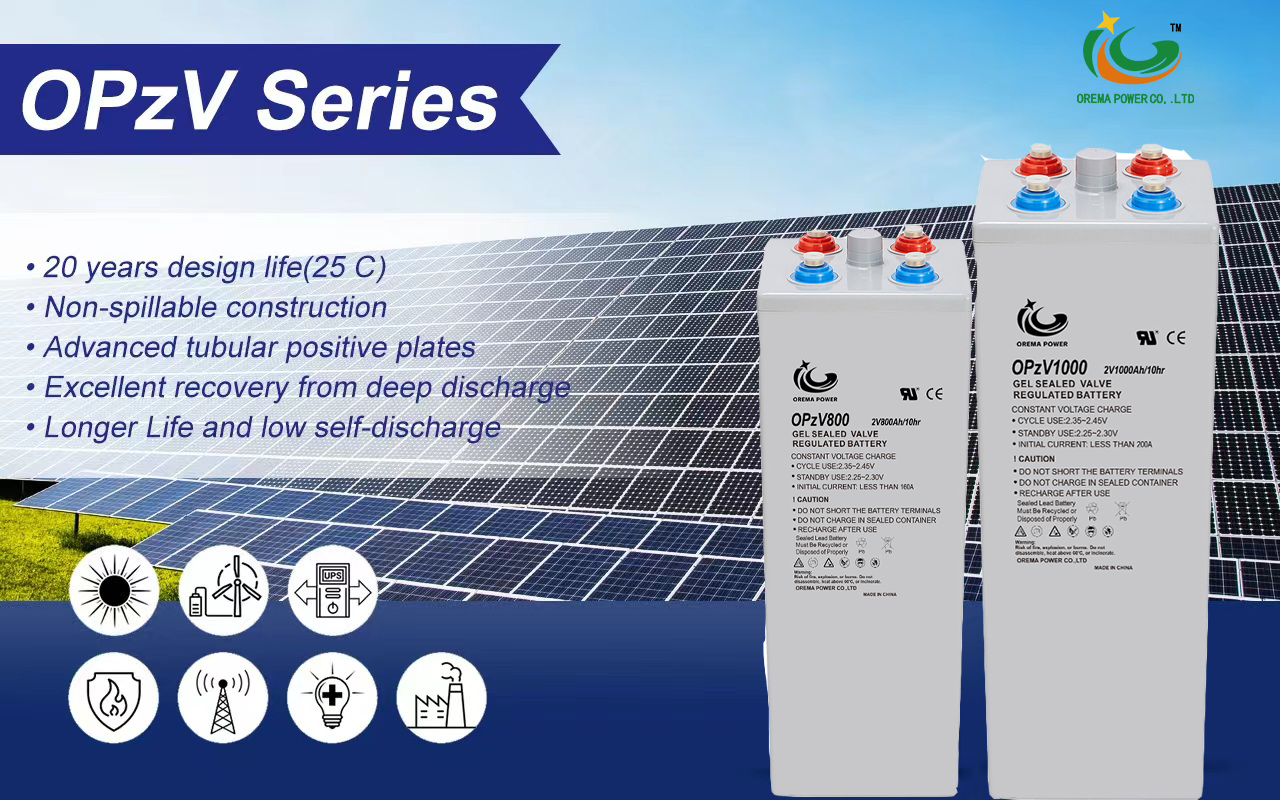
Key Features of OREMA OPzV series Tubular GEL Batteries:
Robust Longevity: Engineered for over 20 years of service life at 25°C, perfect for long-term applications.Exceptional Temperature Resilience: Optimal performance in extreme temperatures, ranging from -40ºC to 60ºC.
State-of-the-Art Corrosion Resistance: Enhanced durability with Lead Calcium die-cast grids.
Revolutionary Cycle Life: Tubular positive plates designed for prolonged and efficient cycling.
Unparalleled Discharge Recovery: Expertly crafted for deep discharge applications with exceptional recovery capabilities.
Innovative Gel Electrolyte: Fumed Silica gel technology, eliminating leakage and maximizing conductivity.
Applications of OREMA OPzV series Solar GEL Batteries:
High-stakes telecom and electric utility sectors.Cutting-edge control and security systems.
Critical medical equipment and robust UPS systems.
Solar power and renewable energy systems.
And numerous other high-demand applications.
Specifications of OREMA OPzV series Lead-acid Tubular Batteries:
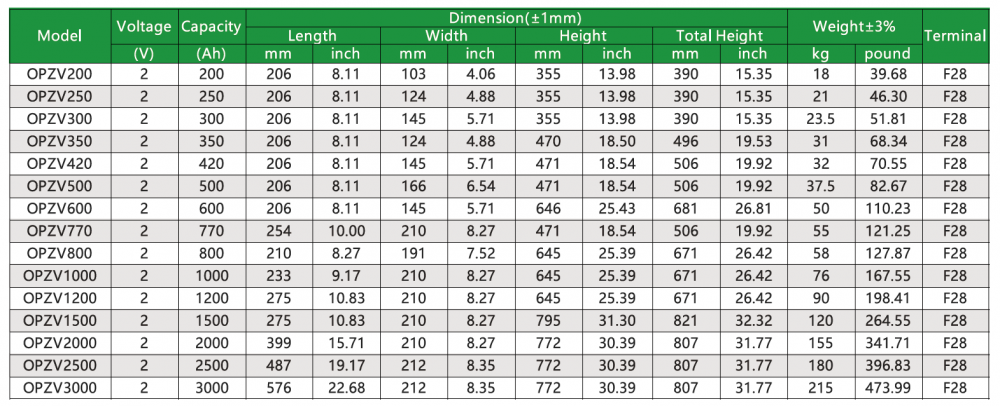
OPzS Series: Ultimate Tubular Flooded Batteries
The OREMA OPzS series encapsulates our commitment to reliability and performance. Utilizing tubular plate technology, these flooded lead acid batteries are a powerhouse of efficiency and endurance.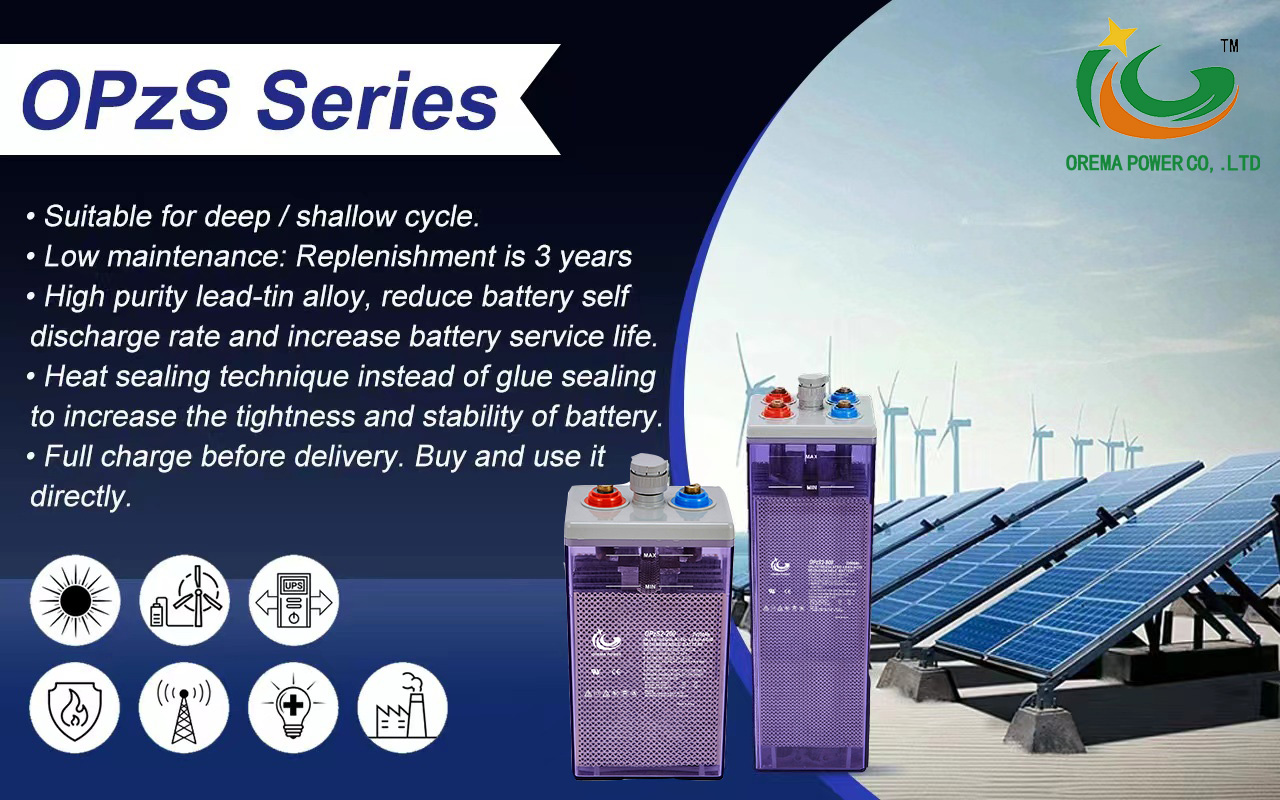
Key Features of OREMA OPzS Series Tubular Batteries:
Cycling Mastery: Exceptional over 2000 cycles at 80% Depth of Discharge (DOD).Versatile Cycling Compatibility: Ideal for both deep and shallow cycle applications.
Sustained Performance: Low maintenance and long-lasting, even in demanding conditions.
Acid Mist Filtration: Specialized filtration for safer and cleaner operation.
Thermal Tolerance: Designed to perform in a wide range of temperatures.
User-Friendly Design: Transparent containers for effortless maintenance checks.
Extended Service Life: Over 20 years of reliability at 25°C/77°F.
Applications of OREMA OPzS Batteries:
Telecommunication infrastructures.Essential electric utilities and control systems.
Vital medical and emergency power supplies.
Renewable energy installations, including solar and wind power.
OREMA: A Global Vision with Local Impact
Specifications of OREMA OPzS Series Tubular Batteries:
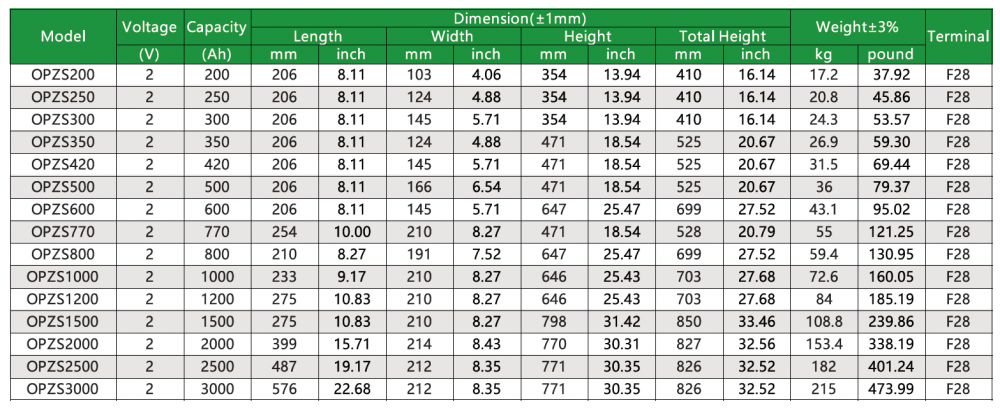
At OREMA, we're not just selling batteries; we're creating partnerships and powering progress. Our OREMA tubular batteries are more than products; they're a promise of quality, durability, and reliability. We are dedicated to providing high-capacity, long-life power solutions without compromising on environmental sustainability. Our global reach and local impact reflect our commitment to delivering power solutions that are not only effective but also responsible.
Join us in our journey towards a more efficient and sustainable future. Choose OREMA for power solutions that you can rely on, today, tomorrow, and beyond.
OpzV Batteries,OpzS Batteries,Tubular Batteries,Tubular GEL Batteries,Tubular Flooded Batteries
OREMA POWER CO., LTD. , https://www.oremapower.com